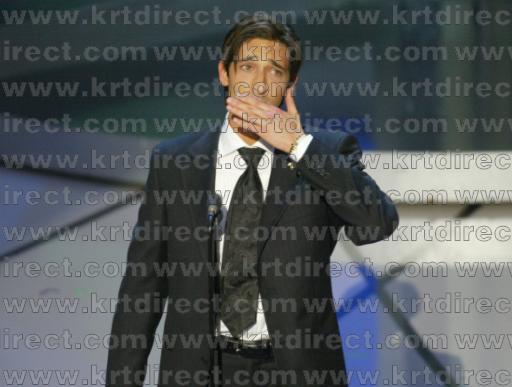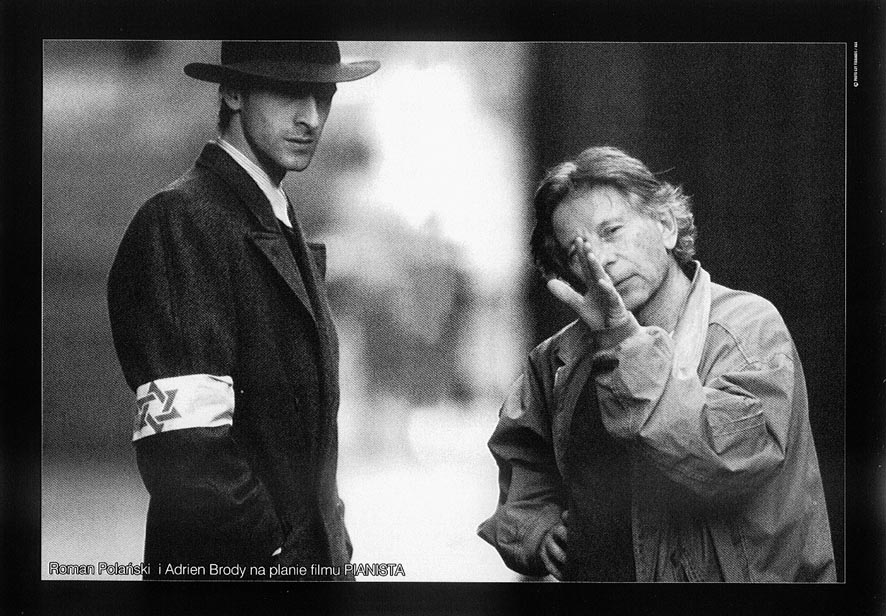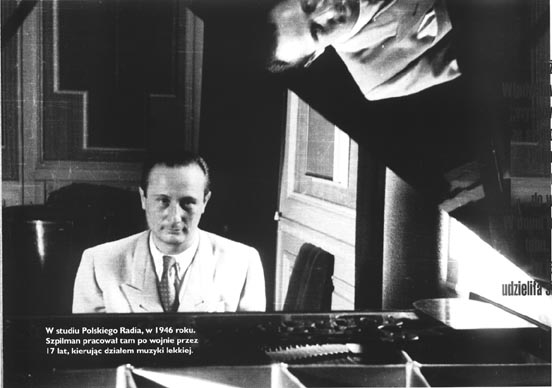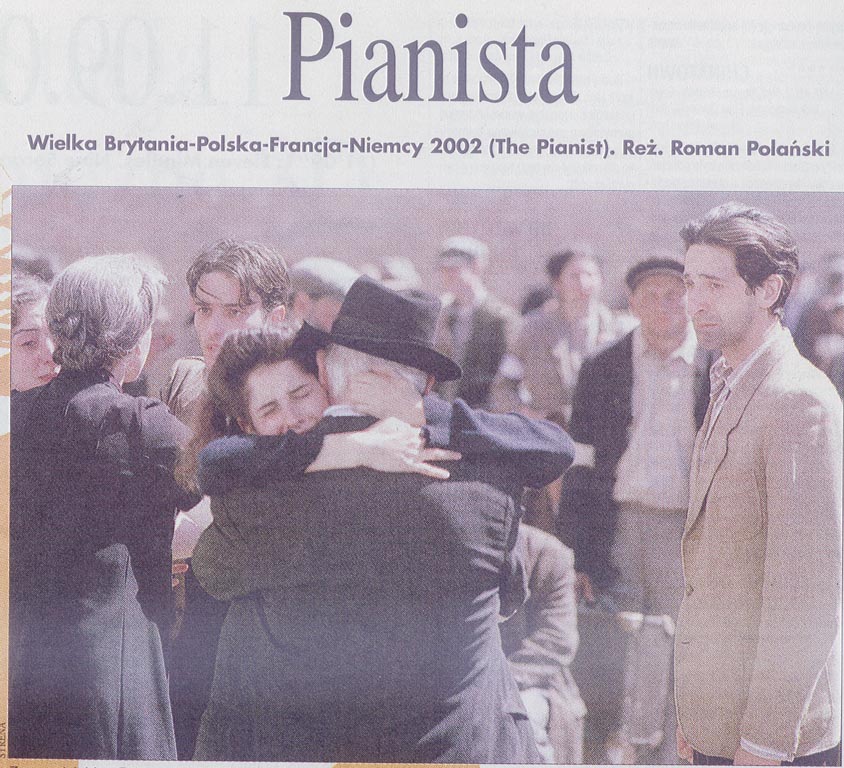



Pictured here at the awards ceremony
with Halle Berry (2) and Nicole Kidman (3)
Click here to read his acceptance speech (if you did not yet get it in the mail from me, he he :)
Roman's short thanks to the Academy

I was not a big fan of Polanski's work before I saw 'The Pianist.' I wasn't crazy about 'Rosemary's Baby' or 'Chinatown,' or any of his early films that some of my friends watched millions of times. I kind of liked 'Repulsion,' but that was it, and I'd only seen it once and have not felt like giving it a try again since. But watching Roman's latest release felt like something so much different, something more than any of the 'good' films I have enjoyed watching in the past weeks, years maybe… Throughout the whole two and a half hours, I was never for a single second bored or distracted, my thoughts could not drift away from the story that was so majestically unwrapping in front of me, making me a solitary witness of Wladyslaw Szpilman's wartime fate.

Wladyslaw Szpilman at work in the Polish radio, 1946
The entire room was silent from the first moment, when on screen appeared pre-war movie chronicles, showing Warsaw on a sunny summer day, with people crowding its streets, parks, theaters and avenues, lined with 19th century apartment buildings, similar to the ones you can see in today's Vienna or Prague. And then the viewer's quickly taken indoors of the building where the Polish Radio station used to be, inexisting today, into the recording studio where the well known pianist, Wladyslaw Szpilman, is on the air, in the middle of a concert created by that most Polish of all composers, the quintessential exiled patriot spilling his heart out in memory of his lost fatherland, also one of the most talented pianists of all time, Frederic Chopin. Chopin's music will return later in the film, and in the grandiose closing scene the surviving Szpilman will be shown once again, playing his music in front of a full-house audience in the Warsaw Philharmonic, barely a year after the end of the war. It has been pointed out by the all-knowing Polish film critics that such a 'structure' is typical of Polanski's works, as many of his movies begin and end with a very similar scene, the story coming back to the point where it had started. Is it something that comes out unnatural? Artificial? Awkward? Certainly not, and having witnessed the whole terrible madness and turmoil of war, the viewer barely notices the resemblance between that elegant, solemn concert at the end of the film and the more 'private,' intimate moment of Szpilman's opening performance so brutally interrupted by bombings. But the critics w i l l analyze that, so let them do it… that's how they earn their bread.

Wladyslaw Szpilman's son, Andrzej,
on the set of 'The Pianist'
But what annoyed me most about one unfriendly review of 'The Pianist,' published in one of Poland's most popular weeklies, 'Polityka,' was the unprofessional tone of the writing, which all in all sounded more like some piece written for a school paper by a cross young boy envious of a friend's successful performance in a school play… The author just could not resist painting himself as a lone ranger daring to criticize a medium-quality film (or, as he puts it, an unfulfilled work made of a very promising story), while everyone else in Cannes was on their knees complimenting the director on his latest production. Very strange, because in my opinion a critic at work would better use their eyes and heart and soul rather than their personal feelings, especially the pride and envy that devours them, when finally, after years of repetitive and imitative trash we have been given a truly great movie. And what do the critics do? They ignore completely the authentic and deeply moving power that radiates from the screen, and put down the absurd statement that Adrien Brody's acting is 'surprisingly emotionless, as if the whole story was happening next to him, without his participation.' And all that under a huge still of the actor walking by himself on a deserted ghetto street with scattered personal belongings of the people just driven away to be executed, with as desperate a look on his face as it's only possible, including red eyes screaming desperation, beautifully raised eyebrows and a half-open mouth- the face of a weeping, deeply disturbed man.
And in the end I'd like to add that, again in spite of what the critics say, this film is not a cleverly made string of tricks that Polanski turns on us, nor is it a line of very convincing 'real-life scenes' from the ghetto, shown more like stills on a projector than a film production. It is in fact a rather fast-paced story, only as fast as needed to give the viewer an honest picture of what war was like in Warsaw, or, for that matter, any other big town in Poland (Polanski himself spent much time in the ghetto in Cracow when he was a child). It has scenes of fighting: we learn about the outbreak and defeat of the Ghetto uprising in 1943, and the great Warsaw Uprising in August 1944, at the same time as Szpilman, already in hiding outside of the ghetto. We see examples of bravery and sacrifice, but also of spite, swindles and denunciation. But also we see people passing through Szpilman's life, touching him for a moment, then disappearing, then emerging again, by chance, people he has known, people he loved, befriended, people who helped and who used him to get their own. And finally the incredible character of the German officer, wonderfully placed by Thomas Kretschman, to whose kindness the artist was to owe his life, illuminates the story with a lighter, poetic shade of raw feeling. And, very important information for all my American friends: it's all in English, except for a few passages in German which I believe are accompanied by subtitles!

The Pianist
A film by Roman Polanski
Cannes Film Festival Palme d'Or 2002
Starring: Adrien Brody, Thomas Kretschman, Frank Finlay, Maureen Lipman, Emilia Fox.
http://www.thepianist-themovie.com/
http://www.adrien-brody.com/ (an unofficial website)

